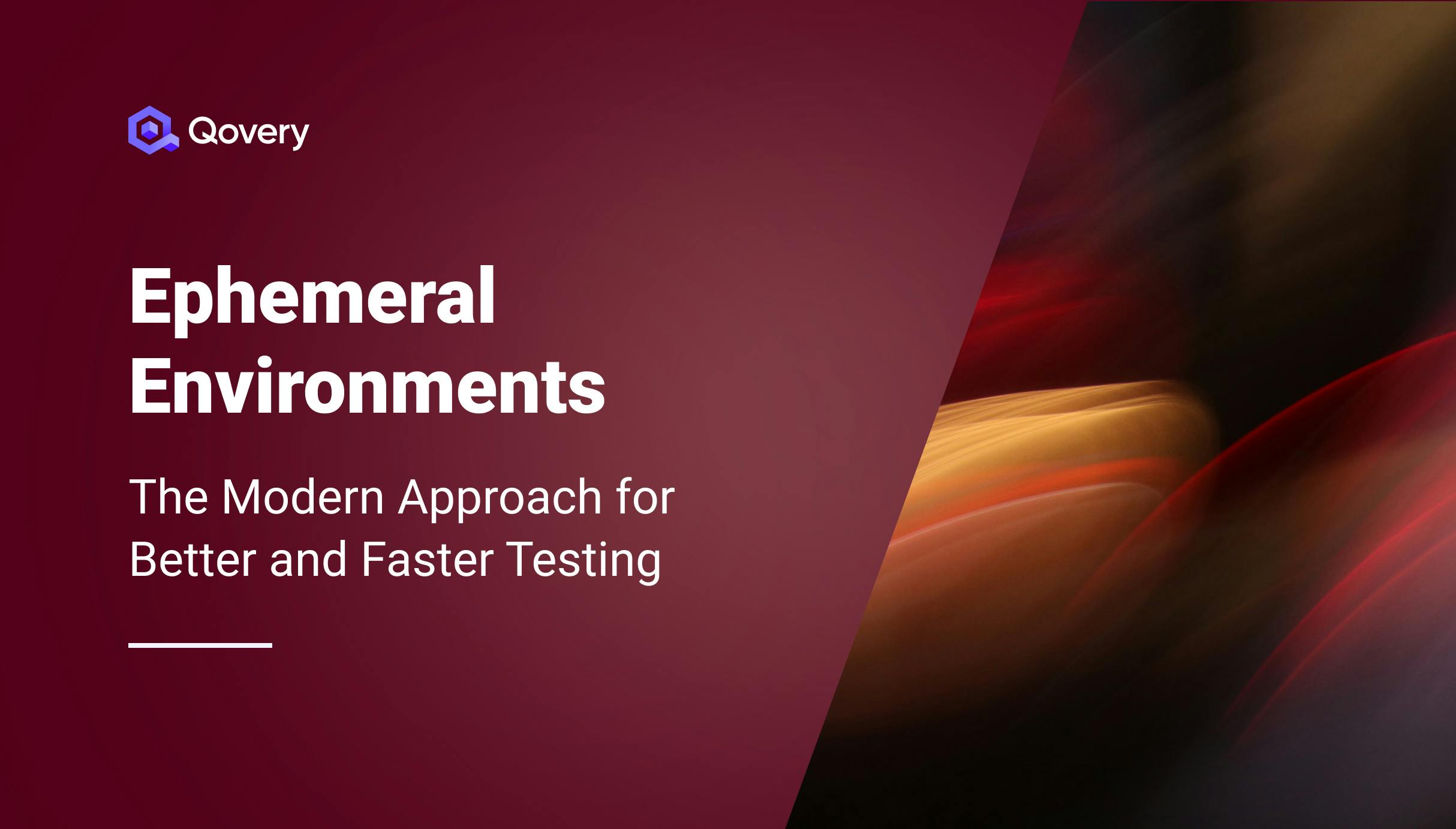Environment as a Service (EaaS): A Comprehensive Comparison Analysis
Choosing the right solution to manage your application & environment infrastructure is crucial. As the demand for environments as a service (EaaS) continues to increase, more and more platforms are emerging, making it difficult to decide which one to choose. In a recent comparative analysis of environment-as-a-service (EaaS) solutions on the market, Qovery was one of four solutions evaluated, alongside Release, Bunnyshell, and AWS Proton. The study was conducted by Pablo E. (a Delivery Manager working for a large aeronautics company) and provided a comprehensive analysis comparing four leading EaaS solutions on the market. We were fortunate enough to gain access to his findings and are excited to share them with you.

Morgan Perry
May 26, 2023 · 7 min read_%20%20A%20Comprehensive%20Comparison%20Analysis.jpg?ixlib=gatsbyFP&auto=compress%2Cformat&fit=max)
#Comparative Analysis
This report will analyze the four solutions based on several criteria: product maturity, developer experience, security, integration, environment types and features, troubleshooting, extensibility, feature requests, and pricing.
Let’s dive into the details of this comparative analysis to better understand the strengths and weaknesses of each solution and how it could help you make an informed decision on which one suits your needs.
Disclaimer: It's important to note that the analysis conducted by Pablo E. reflects his personal experience and preferences. We encourage readers to conduct their own evaluations and consider their specific requirements before making a final decision.
Let's start with the first criterion!
#Product Maturity
The product maturity of each solution was assessed on a scale of 1 to 10. Qovery received a solid score of 7, while Release and Bunnyshell scored 5 and 7, respectively. AWS Proton took the lead with a maturity score of 8.
#Developer Experience (UI)

Release offers a clean and simple UI, although a redesign is recommended. It has a mid-level navigation system, but it lacks themes and the ability to extend the UI and engine.
Qovery stands out with its modern UI toolkit, providing an intuitive and user-friendly experience. It offers the ability to extend both the UI and engine through open-source options. Qovery provides high-quality documentation, integrates it across the UI, and supports email and webhook notifications. It offers a solid developer experience.
Bunnyshell has a mid-high navigation system but lacks themes and the ability to extend the UI. It falls short in providing direct feedback on the UI and extending the engine.
AWS Proton offers a modern UI and high-level navigation system. Although it lacks themes and extending options, it integrates documentation effectively. It supports email and webhook notifications, providing a satisfactory developer experience.
#Security
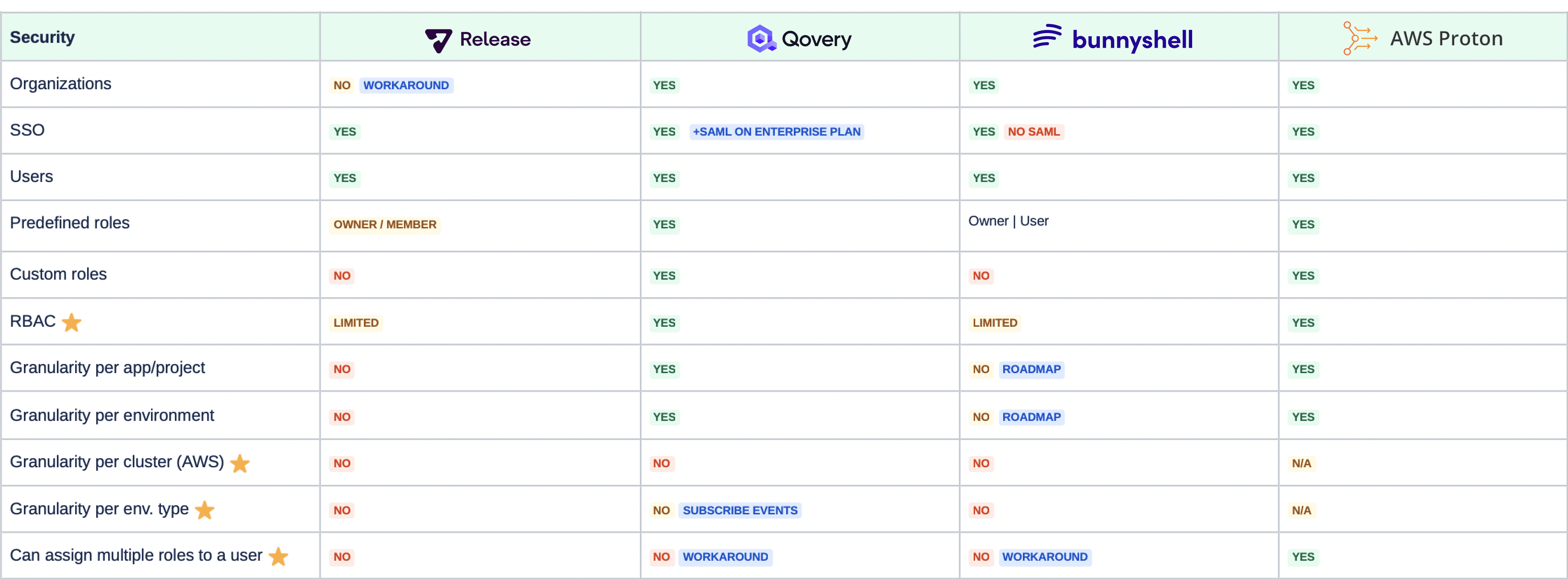
Release offers basic security features but falls short in terms of organizations and user management, requiring workarounds and lacking customization options for roles.
Qovery stands out with its seamless integration with organizations, SSO capabilities, and granular control over app/project and environment permissions. It provides a solid foundation for secure deployments.
Bunnyshell offers similar security features to Qovery, with strong support for organizations and user management. However, it lacks SSO integration and falls behind in terms of RBAC and granular control.
AWS Proton demonstrates strong security capabilities, including organizations, SSO with optional SAML integration, and customizable roles. It excels in providing a secure environment, although it doesn't offer granular control over app/project or environment permissions.
#Integration
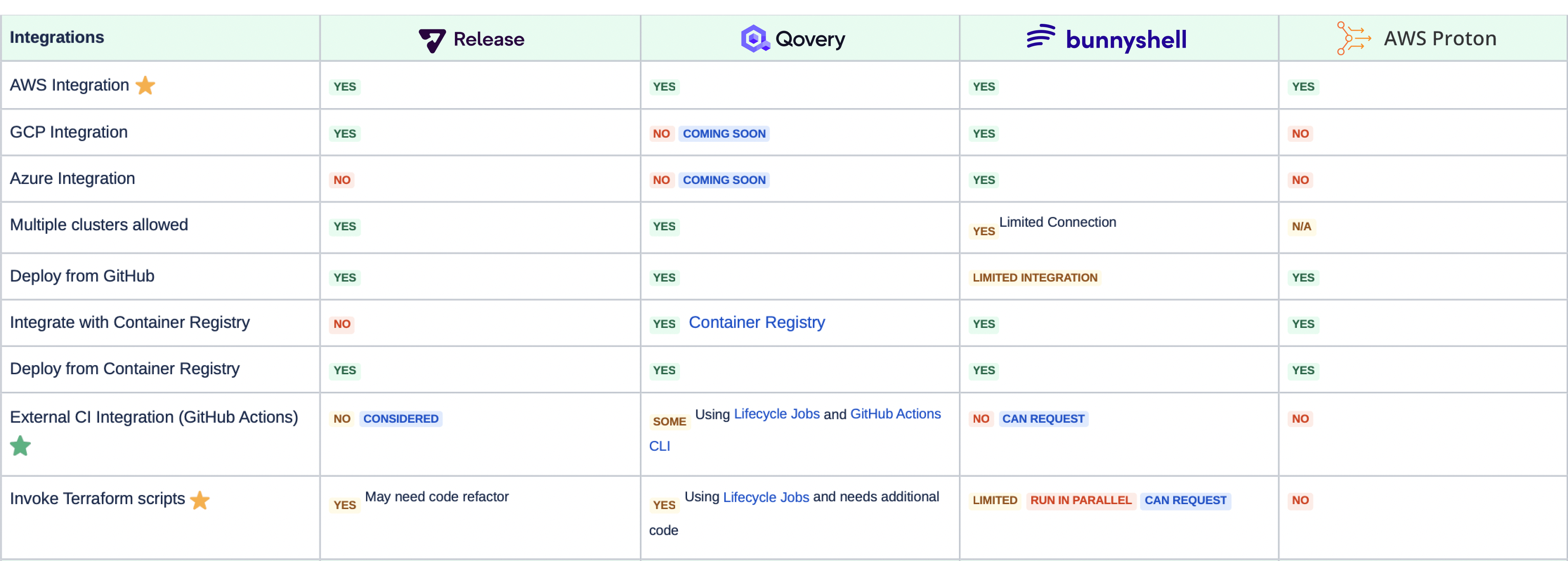
Release provides integration with AWS and GCP, allowing users to leverage its services effectively. However, it lacks integration with Azure. It also has limited support for external CI integration and invoking Terraform scripts.
Qovery offers comprehensive integration with AWS but does not yet support GCP and Azure (planned for the end of 2023). Qovery also enables integration with container registries, making it easy to deploy applications directly. It provides good support for external CI integration and allows users to invoke Terraform scripts efficiently.
Bunnyshell, on the other hand, offers full integration with AWS, GCP, and Azure, allowing cross-platform capabilities. It also has integration with container registries but does not support external CI tools, hindering the flexibility of application deployment and automation.
AWS Proton provides integration with AWS services, ensuring a seamless experience within the AWS ecosystem. However, it falls short in supporting GCP and Azure integration, limiting its compatibility with multi-cloud environments. Proton also has limited support for external CI integration and invoking Terraform scripts.
#Interface Types
When it comes to interface types, all four solutions - Release, Qovery, Bunnyshell, and AWS Proton - offer UI, CLI, and API support. Still, Qovery stands out with its strong support for Terraform Provider. Additionally, Qovery seems to be the only solution that has made their entire interface open-source, allowing users to adapt it according to their needs.
#Environment Features
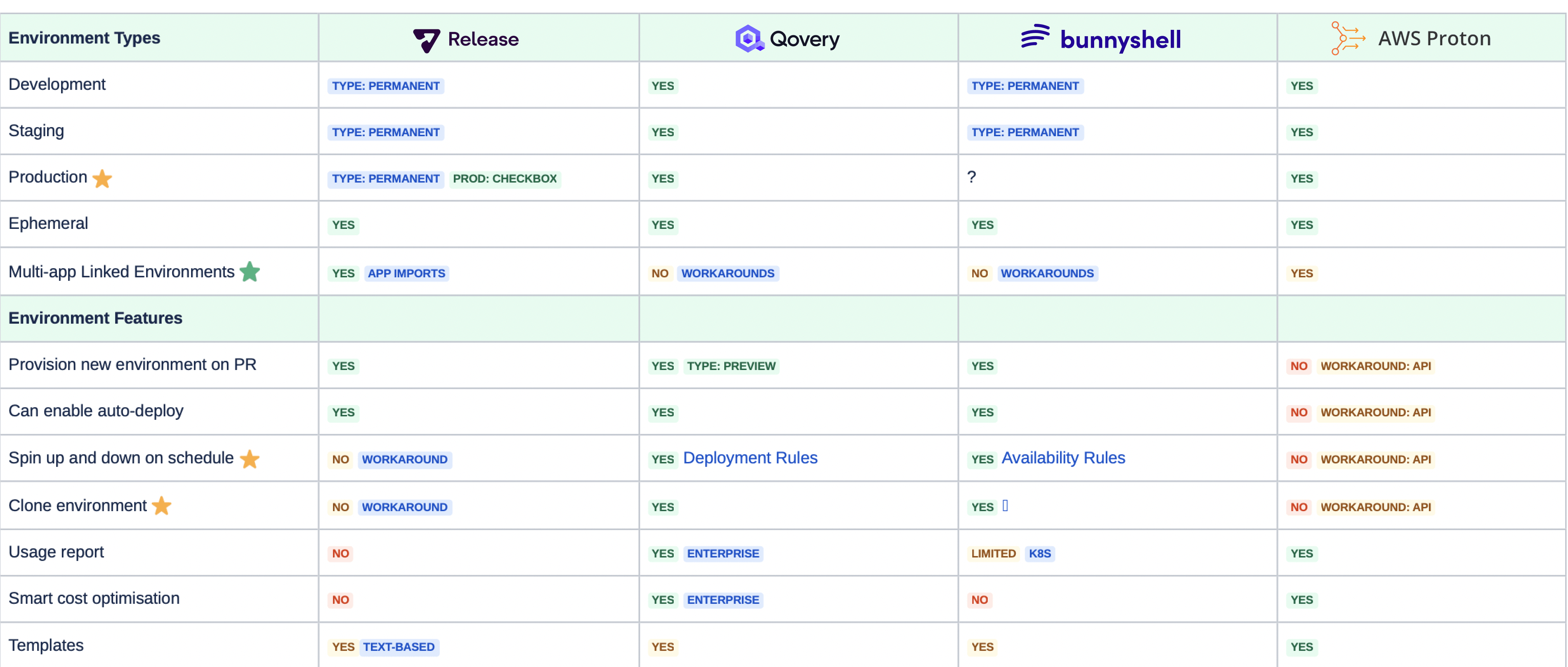
All four platforms support development, staging, production, and ephemeral environments, but only Release provides multi-app linked environments, whereas Qovery offers a workaround for it.
Let’s dive into the Environment features.
Release: supports provisioning new environments on pull requests and enables auto-deploy. However, features like scheduling spin-ups and downs and cloning environments require workarounds or API integrations. It does not provide usage reports or smart cost optimization, and its template system is not text-based.
Qovery stands out with support features like cloning environments but also provisioning new environments on pull requests and enabling auto-deploy. Qovery provides usage reports, smart cost optimization, and a text-based template system, enhancing user experience and cost efficiency.
Bunnyshell also supports the same features as Qovery while offering limited usage reports and lacking smart cost optimization.
While AWS Proton does not support provisioning new environments on pull requests or enabling auto-deploy (requiring a workaround), still, it offers usage reports and smart cost optimization.
#Extensibility, Troubleshooting & Features Request

#Extensibility
Qovery is the only solution among the four that allows integrating tools and extensions, providing flexibility and customization options with the LifeCycle Jobs feature. Qovery supports lifecycle jobs, which allow performing custom actions during the deployment process, whereas Bunnyshell seems to provide some Terraform modules.
#Troubleshooting
Release lacks real-time logging, log search (filtering results), and log filtering by component. It does not provide strong troubleshooting capabilities in terms of logging.
Qovery offers real-time logging, and log filtering by component but lacks log search (filtering results). It provides users with the ability to troubleshoot their applications effectively by accessing and filtering logs.
Bunnyshell provides strong capabilities with real-time logging, log search (filtering results), and log filtering by log level.
AWS Proton provides log filtering by component and log level. However, it does not offer real-time logging and log search (filtering results). While it offers some troubleshooting features, there may be limitations in terms of comprehensive log analysis and search functionality.
#Features Request
Qovery seems to stand out among the compared solutions in terms of providing a clear and public roadmap for feature requests. This demonstrates Qovery's commitment to listening to user feedback and continuously improving the platform based on user needs.
#Pricing

When it comes to pricing, the compared solutions offer different models. Release follows a pay-as-you-go approach, allowing users to pay based on their usage. On the other hand, Qovery and Bunnyshell offer a more transparent and predictable cost structure, taking into account user usage as well as certain premium features. However, AWS Proton lacks clear pricing information, making it difficult for users to understand the cost implications of using the platform. Overall, Qovery and Bunnyshell provide users with greater visibility and control over their expenses, while Release offers a flexible pay-as-you-go model. In contrast, the lack of clear pricing from AWS Proton may create uncertainty for users in terms of budgeting and cost management.
Notably, as an advanced AWS partner, Qovery has the capability to provide credits of up to $100k. Read more here.
#Conclusion
In the rapidly evolving landscape of environment-as-a-service (EaaS) solutions, choosing the right platform to manage your application and environment infrastructure is crucial. After conducting a comprehensive comparative analysis of four leading EaaS solutions, including Qovery, Release, Bunnyshell, and AWS Proton, we have gained valuable insights into their strengths and weaknesses across various criteria.
Qovery, with its solid product maturity score and modern UI toolkit, offers an intuitive and user-friendly developer experience. It excels in security with seamless integration with organizations, SSO capabilities, and granular control over permissions. The platform also shines in terms of integration, providing comprehensive support for AWS services and efficient deployment through container registries. Qovery's emphasis on extensibility, including the ability to integrate tools and extensions, further enhances its flexibility.
While each solution has its unique advantages, it is essential to consider your specific requirements. Release offers a pay-as-you-go pricing model, providing flexibility for users. Qovery and Bunnyshell, on the other hand, offer transparency and predictability with their cost structures and consider user usage. AWS Proton, although lacking clear pricing information, provides robust security features within the AWS ecosystem.
It's important to note that the analysis was conducted by an external contributor and reflects his personal experience and preferences. We encourage readers to conduct their own evaluations and consider their specific needs before making a final decision.
To experience first-hand the power of Qovery's EaaS, start a 14-day free trial. Sign–up here - no credit card required!
Your Favorite DevOps Automation Platform
Qovery is a DevOps Automation Platform Helping 200+ Organizations To Ship Faster and Eliminate DevOps Hiring Needs
Try it out now!

Your Favorite DevOps Automation Platform
Qovery is a DevOps Automation Platform Helping 200+ Organizations To Ship Faster and Eliminate DevOps Hiring Needs
Try it out now!
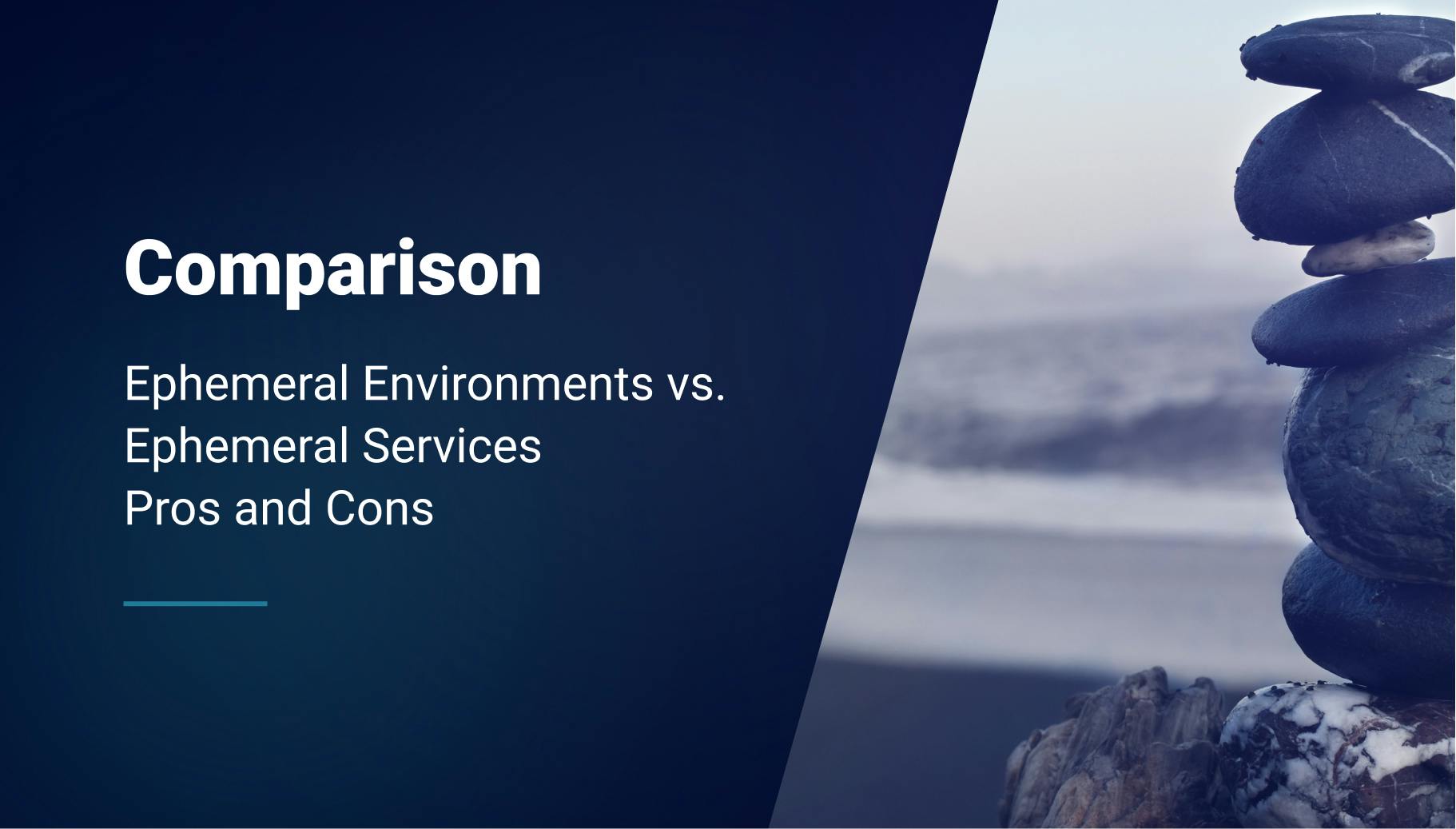
.jpg?ixlib=gatsbyFP&auto=compress%2Cformat&fit=max)
